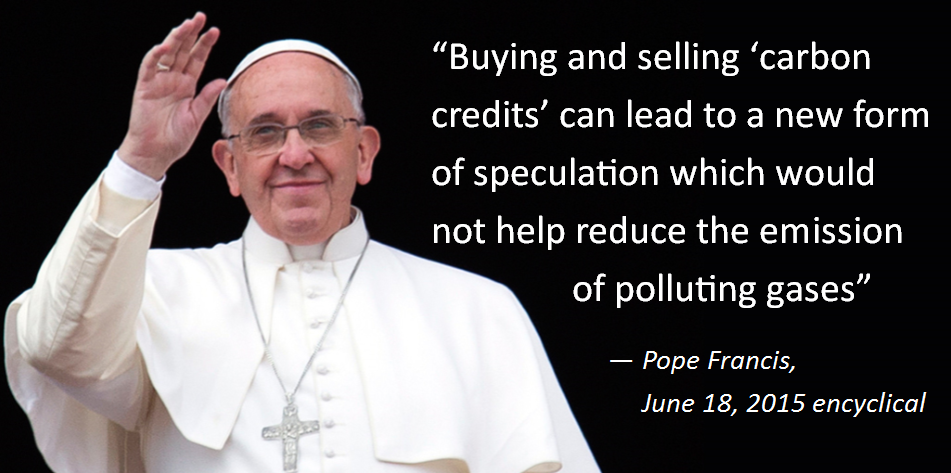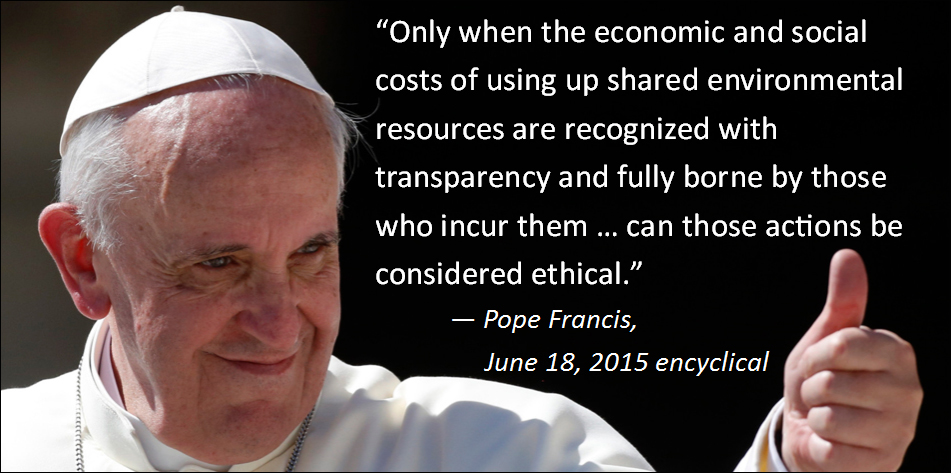New York Times climate reporter Coral Davenport writes today that Pope Francis’s warning against cap-and-trade as a tool to address the climate crisis creates a “paradox”:
[W]here Francis’ environmental and economic agendas meet, he leaves something of a paradox. . . While urging swift action to curb the burning of fossil fuels that have powered economies since the Industrial Revolution, he also condemns the trading of carbon-emission credits, saying it merely creates new forms of financial speculation and does not bring about “radical change.” But carbon trading is the policy most widely adopted by governments to combat climate change, and it has been endorsed by leading economists as a way to cut carbon pollution while sustaining economic growth.
With due respect to Davenport as well as Robert Stavins, the Harvard climate economist whose concerns figure prominently in her story, there is no paradox. Francis’s encyclical, On Care For Our Common Home, doesn’t muddy the climate change debate because a carbon tax, not cap-and-trade, is economists’ preferred policy tool for curbing carbon pollution.  Francis criticizes emissions trading on three grounds: First, trading carbon allowances allows traders to profit from the climate crisis — indeed, it’s designed to do that. Second, “offsets” that are virtually hard-wired into cap-and-trade shift the burden of pollution to developing countries. Third, cap-and-trade with offsets absolves the wealthy of responsibility to rein in their carbon-intensive lifestyles. In Francis’s own words:
Francis criticizes emissions trading on three grounds: First, trading carbon allowances allows traders to profit from the climate crisis — indeed, it’s designed to do that. Second, “offsets” that are virtually hard-wired into cap-and-trade shift the burden of pollution to developing countries. Third, cap-and-trade with offsets absolves the wealthy of responsibility to rein in their carbon-intensive lifestyles. In Francis’s own words:
The strategy of buying and selling carbon credits can lead to a new form of speculation which would not help reduce the emission of polluting gases worldwide. This system seems to provide a quick and easy solution under the guise of a certain commitment to the environment, but in no way does it allow for the radical change which present circumstances require. Rather, it may simply become a ploy which permits maintaining the excessive consumption of some countries and sectors. [171]
What, then, does Francis demand? That societies internalize the costs of pollution, especially climate pollution:
[O]nly when the economic and social costs of using up shared environmental resources are recognized with transparency and fully borne by those who incur them, not by other peoples or future generations, can those actions be considered ethical. [195]
A reference in that passage attributes Francis’s calls for polluters to pay “the economic and social costs” they incur to his predecessor, Pope Benedict. (Both pontiffs presumably intended “impose” rather than “incur,” i.e., for costs to be borne by those who impose them, but no matter.) Those resources surely include clean air. The new encyclical thus aligns the Catholic Church with the century-old “Pigovian” tradition of economists urging policies to internalize costs.  Nevertheless, in an email quoted by Davenport, Stavins brands Francis as “out of step with … informed policy analysts around the world,” in effect labeling the Pope as economically-illiterate and naïve:
Nevertheless, in an email quoted by Davenport, Stavins brands Francis as “out of step with … informed policy analysts around the world,” in effect labeling the Pope as economically-illiterate and naïve:
“I respect what the pope says about the need for action, but this is out of step with the thinking and the work of informed policy analysts around the world, who recognize that we can do more, faster, and better with the use of market-based policy instruments — carbon taxes and/or cap-and-trade systems,” Robert N. Stavins, the director of the environmental economics program at Harvard, said in an email.
That Stavins is the lone environmental economist quoted in Davenport’s piece did not deter her from claiming that “environmental economists criticized the encyclical’s condemnation of carbon trading, seeing it as part of a radical critique of market economies.” Hardly. The Pope, like legions of environmental activists and economists worldwide, has seen the shams of emissions trading and carbon “speculation” for what they are. As Stavins well knows, the world’s largest such system, the European Union’s “Emissions Trading Scheme,” has proven a deeply problematic and ineffective way to “put a price on carbon” for two reasons:
- First, emissions trading inherently entails volatile and speculative markets which impose enormous transactions costs on the public while hiding the price of pollution — exactly the opposite of the “transparency” the Pope calls for.
- Second, emissions trading schemes almost invariably include offsets which “in the guise of a certain commitment to the environment” attempt to shift burdens to developing countries while “maintaining the excessive consumption” of fossil fuels by rich countries and highly polluting sectors, as the Pope noted. For these reasons, emissions trading has largely failed to “help reduce the emission of polluting gases worldwide.”
Contrary to Stavins, then, neither Francis nor Benedict was indulging in some odd deviation from economic reality. Their clarion call for “transparent” internalization of the costs of pollution is not only perfectly aligned with mainstream economics; it is overwhelmingly supported by theory and practice which concludes that a simple direct carbon tax is the most transparent and effective corrective to shift “the economic and social costs” of climate pollution onto “those who [impose] them” and incentivize the transition to clean energy that the Earth so desperately needs. In fewer words: Make Polluters Pay. Tax Carbon Pollution.

Sid Madison says
For a long time I did not take sides in the “cap & trade” or “carbon tax” debate. Mostly because the key issue of ASAP gets lost in the debate. And in part because some economists say either process can be successful if implemented properly.
Not being an economist, I favor a carbon tax since it follows the KISS principle. Also I joined Citizens’ Climate Lobby because it is focused on passing a progressively increasing tax on processes that create greenhouse gases with adjustments for imports and exports and our proposal is not regressive.
Greg Hamra says
I disagree with the suggestion that Pope Francis “out of step with … informed policy analysts around the world” or (necessarily economically-illiterate or naïve. Many would agree that that Cap & Trade (C&T) is not a good fix for a number of reasons. This includes Annie Leonard (Find: “The Story of Cap & Trade” on YouTube) and Republican icon George Shultz who wrote the carbon fee & dividend (CFD) plan which has the endorsement of economists and scientists. The CFD is simpler, it internalizes the costs that have, for years, been socialized as profits are privatized. It’s a fiscally conservative plan that avoids regulations, does not grow government and returns the funds to every household. This leverages the power of capitalism and will result in job growth, and will enrich about 2/3 of Americans. This has been vetted by REMi, the economic modeling powerhouse used by many top companies and government entities. I’d hardly call them economically-illiterate or naïve. C&T is not the answer. For many reasons, many consider a CFD to be the most politically viable solution. Even the conservative/libertarian R Street Institute think tank agrees CFD is the best choice. So does Hank Paulson. I can go on but I won’t. Have a look. http://youtu.be/9oyguP4nLv0
Climate Solutionist, Leader, Miami Chapter – Citizens’ Climate Lobby
Rick Knight says
James and Charles, you are SO very right here! I have read the relevant portions of the encyclical and, as you accurately note, while the Pope does not explicitly mention carbon taxes, the framing he presents makes it obvious that if the costs of pollution must be “internalized” but that carbon credits are “a new form of speculation” that is unlikely to solve the problem, the only remaining solution is a straightforward carbon tax.
I would like to add one more big downside of cap-and-trade policy: the need to impose a discrete cap on every one of a multitude of emission sources, complete with the attendant bitter negotiations and lawsuits to follow. What cap is “fair”? What about crediting past efficiency improvements? How big or small must an emitter be to require a cap? What clever methods will businesses find to disperse their activities into smaller units that come in just under the cap-subjected minimum size?
NONE of this will occur with a simple upstream carbon tax.
Russell the Stout says
I can’t find this quote from the Pope you wrote about: “The strategy of buying and selling carbon credits can lead to a new form of speculation which would not help reduce the emission of polluting gases worldwide” Where?
Russell the Stout says
It’s there. Apologies.